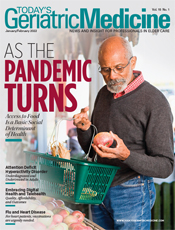
January/February 2022
The Last Word: Pushing Back and Moving Forward: What We Really Need for Brain Health In American Dementia: Brain Health in an Unhealthy Society, my coauthor Danny George, PhD, MSc, and I ask that we practitioners think deeply about the future of clinical care for those with cognitive challenges like so-called Alzheimer’s disease, which is in reality not a single disease but a heterogenous syndrome related to aging. We suggest that there is much wrong about the way we think, value, and act in the dementia field. The FDA’s unfortunate recent accelerated approval of aducanumab, a monoclonal antibody against amyloid, was based on inadequately validated biomarkers as a surrogate for clinical benefit. This flawed process and outcome, which the American Geriatrics Society leadership wisely took a stand against, is a textbook lesson in how to get it wrong at every level—scientific, clinical, ethical, public health, and economic. My mentors Katz and Butler prioritized quality of life and preventive health as our goals. As someone who has studied the social construction of diseases and other health conditions, I often celebrated the invention of the condition “polypharmacy,” which to me represented the idea that geriatricians defend their patients against the excessive prescribing zeal of drug company-influenced specialists. A Time to Reevaluate The field of dementia is distorted by misguided advocacy led by the national Alzheimer’s Association and its faith that science will soon lead us to cures. Uncritical advocates promote diagnostic creep with mild cognitive impairment and now subjective cognitive decline. As it promotes its motto, “care today cure tomorrow,” the Alzheimer’s Association does too little to address care (and public health), as it seems to imagine a future without it. In our book, my coauthor and I point out the cultural cognitive and value limitations—what we call “American dementia”—that characterize today’s Alzheimer’s field and our society at large. But we also share the good news that in the 20th century rates of dementia fell in those Western countries that dramatically improved their education and public health. Education is the best protective factor (along with others, such as physical activity) against cognitive impairment as we age and the best hope for a better future. We’ve both worked with pioneering intergenerational schools in Cleveland, where people with dementia have found meaning and purpose by teaching children. Let’s learn the deeper lessons of dementia. So as clinicians, help your patients (and yourselves) develop true hope by encouraging physical, cognitive, and social activity and by developing the ability to critically evaluate claims of simplistic fixes, especially foolishly expensive ones such as aducanumab. The real current and future potential opportunity costs of not treating our cultural “American dementia” could literally be species threatening. Let’s work together to wise up and design a better course for the future, with improved cognitive, mental, cultural, and planetary health. Let’s speak truth to the powerful people, institutions, and industries that overpromise, underdeliver, and seek profit over people and planet. — Peter J. Whitehouse, MD, PhD, is the coauthor of American Dementia: Brain Health in an Unhealthy Society and The Myth of Alzheimer’s: What You Aren’t Being Told About Today’s Most Dreaded Diagnosis, with Daniel George, PhD, MSc. Learn more at www.americandementia.com. |
